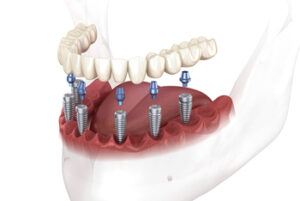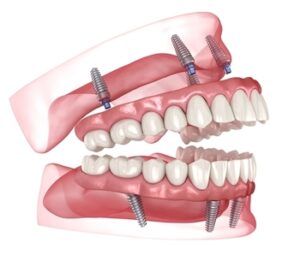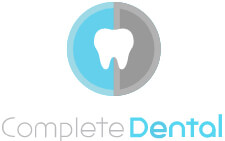A radiant smile can light up a room, exude confidence, and significantly impact self-esteem. However, the journey to that perfect smile, especially when dealing with missing teeth, often leads to considering dental implants. In Australia, dental implant costs can vary widely depending on factors such as single-tooth replacement, full-mouth implants, and the inclusion of components like consultation, surgery, restoration, and maintenance. Affording the cost for full-mouth dental implants can be daunting, but the rewards of a complete set of functional, natural-looking teeth often outweigh the initial investment.
This comprehensive guide explores the complexities of full-mouth dental implants, examining the costs, procedures, and benefits.
Understanding Full Mouth Dental Implants
Full-mouth dental implants are a sophisticated dental solution intended to replace an entire arch of teeth, whether in the upper jaw, lower jaw, or both. This procedure involves placing multiple dental implants into the jawbone and anchors for a full set of replacement teeth. Unlike traditional dentures, full-mouth dental implants, also known as teeth implants, offer a more permanent and stable solution, closely mimicking the feel and function of natural teeth.
What Are Full Mouth Dental Implants?
Full-mouth dental implants involve strategically placing four to eight titanium dental implants per jaw, providing a solid foundation for prosthetic teeth. These implants stimulate the jaw bone, preventing bone loss and maintaining facial structure. This type of implant-supported denture is known for its durability and ability to restore complete oral functionality.
The Initial Consultation and Treatment Planning

The Cost of Full Mouth Dental Implants in Australia
Understanding the cost of full-mouth dental implants is mandatory when it comes to dental implants, as it represents a significant investment in oral health and overall well-being. The starting price for full-mouth dental implants in Australia is approximately AUD 30,000 per arch. This price can vary according to several factors, including the complexity of the case, the materials used, and the expertise of the dentist.
Breaking Down the Costs
Understanding the costs of full-mouth dental implants is important for anyone considering this transformative procedure. Here, we break down the primary expenses involved:
Initial Consultation and Diagnostic Tests: The initial consultation, which includes X-rays and 3D imaging, typically starts at AUD 300.
Dental Implant Surgery: The surgical procedure to place the implants starts at AUD 1,500 per implant.
Bone Grafting: If bone grafting is required to create a solid foundation for the implants, it starts at AUD 500.
Temporary Teeth: Temporary dentures or bridges, used during the healing phase, start at AUD 1,000.
Final Prosthetic Teeth: The final set of artificial teeth starts at AUD 15,000 per arch.
The Dental Implant Surgery Procedure
The journey to a full set of new teeth involves several stages, each critical to the success of the overall treatment. Let’s break down the dental implant procedure into its main components.
Tooth Extraction and Bone Grafting
Tooth extraction is the first step in cases where there are remaining natural teeth that need to be removed. If the bone density is inadequate to support the implants, bone grafting may be required. This process involves transplanting bone tissue to the jawbone, creating a stable foundation for the implants.
Implant Placement
Once the jawbone is ready, the dental implant placement surgery can begin. During this surgical procedure, titanium dental implants are inserted into the jawbone. These implants serve as synthetic tooth roots, providing a sturdy base for the replacement teeth.
Healing Process and Osseointegration
After the implants placement, a healing process called osseointegration occurs. This involves the jawbone growing around the implants and securing them in place. Osseointegration typically takes several months, during which temporary teeth may be worn.
Abutment Placement
Abutments are placed on top once the implants are fully integrated with the jawbone. These small connectors serve as the attachment point for the final prosthetic teeth.
Final Prosthetic Teeth Placement
The final stage involves attaching the custom-made prosthetic teeth to the abutments. These teeth are designed to match natural teeth’ shape, size, and colour, providing a seamless and natural-looking smile.
The Healing Process and Aftercare
The journey to a full set of dental implants doesn’t end with the final placement of prosthetic teeth. Proper aftercare and attention to the healing process are vital for long-term success.
Immediate Post-Surgery Care
It’s normal to experience some swelling and discomfort after the implant surgery. Your dentist will provide instructions for managing pain and preventing infection, including the use of prescribed medications and rinses. It’s essential to follow these guidelines closely to ensure a smooth recovery.
Diet and Lifestyle Adjustments
During the initial healing phase, a soft diet is recommended to avoid putting excessive pressure on the implants. Foods such as yoghurt, mashed potatoes, and smoothies can provide necessary nutrients without compromising healing. Avoiding smoking and excessive alcohol consumption is also crucial, as these habits can impede healing and increase the risk of complications.
Long-Term Maintenance
Maintaining your dental implants requires a commitment to good oral hygiene and regular dental check-ups. Brushing twice a day, flossing, and using an antibacterial mouthwash can help prevent infection and ensure the longevity of your implants. Additionally, visiting your dentist for routine cleanings and examinations will allow for early detection and management of potential issues.
Benefits of Full Mouth Dental Implants
Investing in full-mouth dental implants offers many benefits beyond just aesthetic improvement. Here are some of the key advantages:
Improved Oral Health
Full-mouth dental implants help preserve the jawbone, preventing bone deterioration and maintaining facial structure. This offers a significant benefit over traditional dentures, which can contribute to bone resorption over time.
Enhanced Functionality
Unlike dentures, which can slip and cause discomfort, full-mouth dental implants are securely anchored to the jawbone. This provides a stable and reliable solution for chewing and speaking, closely mimicking the function of natural teeth.
Long-Lasting Solution
With proper care and maintenance, full-mouth dental implants can last a lifetime. This makes them a financially efficient solution in the long run despite the higher initial investment.
Boosted Confidence
A full set of natural-looking teeth can significantly boost self-esteem and confidence. Patients often report feeling more comfortable and willing to smile in social situations.
Risks and Considerations
While full mouth dental implants offer multiple benefits, it’s essential to know the potential risks and considerations involved in the procedure.
- Surgical Risks:

- Cost Considerations: The cost of full-mouth dental implants can be prohibitive for some patients. It’s important to discuss financing options with your dental clinic and explore whether dental insurance can cover part of the treatment.
- Healing Time: The recovery period for dental implants can take several months, during which temporary teeth may be required. Patience and proper oral hygiene are crucial during this period to ensure successful osseointegration.
Maintaining Your Dental Implants
Proper care and maintenance are essential to ensure the longevity and functionality of your full-mouth dental implants. Here are some tips to help you maintain your new smile:
- Good Oral Hygiene: Proper oral hygiene is key for the success of dental implants. This includes regular brushing, flossing, and using antibacterial mouthwash to prevent infection.
- Regular Dental Check-Ups: Regular dental visits are essential to keep an eye on the condition of your implants and ensure your oral health remains optimal. Your dentist can provide professional cleanings and deal with any issues that may arise.
- Avoiding Harmful Habits: Avoiding habits that can damage your implants, such as smoking and chewing on hard objects, is crucial. These habits can compromise the stability of your implants and lead to complications.
Exploring Tooth Replacement Options
There are several options to consider when replacing missing teeth. Here’s a brief overview of other tooth replacement options:
Traditional Dentures: Traditional dentures are removable devices that replace missing teeth. While they are a more affordable option, they lack the stability and functionality of dental implants.
Implant-Supported Dentures: Implant-supported dentures combine the affordability of traditional dentures with the high stability of dental implants. These dentures are firmly attached to the jawbone using implants, providing a more secure fit.
Single Tooth Implants: Single tooth implants are an excellent option for patients missing only one or a few teeth. These implants replace individual teeth, preserving the surrounding natural teeth and preventing bone loss.
The Role of Implant Dentistry
Implant dentistry focuses on the placement and maintenance of dental implants. Choosing an experienced dentist with expertise in implant dentistry is crucial for the success of your treatment. These professionals have the knowledge and skills required to navigate the complexities of dental implant procedures.
The Future of Dental Implants
Advancements in dental technology continue to improve implant dentistry, making full-mouth dental implants more accessible and effective. Innovations such as 3D printing and computer-guided implant placement are enhancing the precision and outcomes of implant procedures.
Emerging Trends
- 3D Printing: 3D printing technology is revolutionising the production of dental implants and prosthetic teeth, allowing for more customised and accurate solutions.
- Computer-Guided Implant Placement: This technology enables dentists to plan and execute implant procedures more precisely, reducing the risk of complications and improving outcomes.
- Biomaterials: Developing new biomaterials for implants enhances their durability and compatibility with natural bone tissue, reducing the risk of implant rejection and improving overall success rates.
Financing Your Dental Implant Procedure
Given the high cost of full-mouth dental implants, exploring financing options is crucial for many patients. In Australia, various payment solutions are available to make dental care more accessible and manageable. Here’s how you can finance your dental implant procedure:
Payment Options
To ensure your needs are met, dental clinics in Australia often offer different payment solutions, including cash, cheque, EFTPOS, and major credit cards. Additionally, flexible payment methods like Afterpay are available to help you budget for dental care more effectively.
Afterpay
Afterpay provides an easy, modern, and affordable way to spread dental care costs. This method is ideal if you prefer to pay for your dental treatment in four affordable, fortnightly instalments. Here’s how it works:
- Book an appointment.
- Download the app.
- Get your barcode in the app to scan at the reception.
- Enjoy great oral health and a beautiful smile!
To use Afterpay, You simply need to live here in Australia, be over 18, and have an Australian debit or credit card. Some proof of identity might be required, although this is often verified automatically when you apply.
Personal Loans
If you cannot cover the entire cost upfront, consider financing options like personal loans or medical credit cards. These loans often come with flexible repayment terms and lower interest rates compared to traditional credit cards. Reviewing interest rates and terms carefully can help you choose the best option for your financial situation.
Government Assistance
Government programs may sometimes offer financial assistance for essential dental treatments, especially for seniors and low-income individuals. Researching available programs and eligibility criteria can help you access your needed support.
By exploring these payment options and financing solutions, you can make the investment in full-mouth dental implants more manageable, ensuring that you receive the high-quality care you need for a healthy, radiant smile.
The Emotional Journey of Getting Full Mouth Dental Implants
Beyond the physical benefits, full-mouth dental implants can have a huge psychological effect on patients. The transformation from dealing with missing teeth or uncomfortable dentures to having a full set of stable, natural-looking teeth can significantly boost self-esteem and overall quality of life.
Restored Confidence
Many patients report a dramatic increase in confidence following their dental implant treatment. Smiling, speaking, and eating without fear of embarrassment or discomfort can improve social interactions and personal relationships.
Improved Mental Health
The psychological perks of dental implants extend to mental health. They can alleviate the stress and anxiety associated with missing teeth or ill-fitting dentures, leading to improved mood and a more positive outlook.
Conclusion: Investing in Your Smile

The journey to a new smile begins with scheduling an initial consultation with an experienced implant dentist. This crucial step sets you on the path to enhanced oral health and renewed confidence. Embrace the possibilities that full-mouth dental implants offer and take control of your dental health today.
In dental advancements, full-mouth dental implants are a transformative solution for replacing missing teeth. With proper planning, expert care, and a commitment to oral hygiene, you can enjoy the many benefits of this innovative treatment, making it a valuable investment in your overall well-being.
Contact Complete Dental, QLD, for high-quality dental implants and flexible payment options at:
Elanora: (07) 5235 8199
Coorparoo: (07) 3801 6503
Note: Any surgical or invasive procedure carries risks. Before proceeding, you should seek a second opinion from an appropriately qualified health practitioner.
Sources:
- Hauer, P. (2019). Post-op for implant patients. DrHauer.net. Retrieved from https://www.drhauer.net/wp-content/uploads/2019/11/Post-op-for-imp-patients10312019133948-1.pdf
- How Much Do Dental Implants Cost? (2023). Forbes Health. Retrieved from https://www.forbes.com/health/dental/how-much-dental-implants-cost/
- Afterpay. (n.d.). Afterpay. Retrieved from https://www.afterpay.com/en-AU
- Hwang, D., & Wang, H. L. (2008). Implant surgery complications: etiology and treatment. Implant Dentistry, 17(2), 159-168. Retrieved from https://journals.lww.com/implantdent/fulltext/2008/06000/implant_surgery_complications__etiology_and.6.aspx
- Colgate. (2015). Dental Implants Cost Explained. Colgate Oral Health. Retrieved from https://www.colgate.com.au/oral-health/implants/dental-implants-cost-explained-0415









